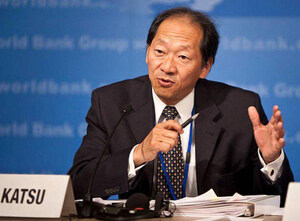Corrupt Oligarchs and Officials the Main Threat to Moldova
BRUSSELS, November 6, 2015 /PRNewswire/ --
Can Europe finally admit that it was fooling itself when it rushed to sign an Eastern Partnership association agreement with Moldova? The recent developments in Moldova urgently press for such a confession to be made. In fact the Agreement gave unlimited access to state coffers for two rival oligarchs, each embroiled in corruption and looting of state assets.
Europe called Moldova's story a success, but the reality is one of disappointment, collapse of rule of law and threat of civil unrest.
The so-called pro-European parties that came to power in Chisiniau had created a highly corrupt system which was aimed at stealing European money and state budget.
Power in Moldova belongs to a small group of oligarchs headed by "two Vlads"- Vlad Plahotniuc and former premier Vlad Filat.
Filat, at present an MP stripped of his immunity, is accused of being directly involved in the massive corruption scandal known as "the robbery of the century" after it was revealed that in 2014 one billion dollars - or 15% percent of the GDP - was mysteriously siphoned out of Moldova's three main banks.
Vlad Filat has been arrested and a criminal investigation has been launched, alleging charges of corruption when he was heading the Government. Filat's arrest is just the tip of an iceberg of a pervasively corrupt political system.
Over the past six years Moldova has undergone an unfortunate transition from being hailed as the "success story" of the Eastern Partnership to a "captured state", as worded by the secretary general of the Council of Europe.
The politicization of state institutions deepened in 2009, the year a new pro-European coalition took office with Filat as prime minister. Prominent state positions were distributed among the three governing parties.
The billion-dollar banking scandal was only the most dramatic of many episodes of corruption. The years 2011-2013 saw "raider attacks" on the economy that involved corrupt Moldovan judges.
In April this year the British investigative company Kroll made a confidential report --which was soon leaked-- on the missing money. The heads of the National Bank, the Anticorruption Centre and the Secret Service claimed they were perfectly aware of the criminal schemes and had already informed prime minister Filat and president Timofti.
Moldova is facing the prospect of the "failed state" if its young democratic system remains in the hands of oligarchs. The current government crisis has proved this.
In order not to compromise its European aspirations, Moldova should - before it's too late - get down to the hard job of uprooting corruption.
The country must now think of its democratic security. It must immediately take urgent steps to purge corrupt officials and judges, fix the banking system and bring to justice individuals responsible for the massive banking fraud.
Political involvement should be eliminated from the judicial system, with immunity for state prosecutors and parliamentarians withdrawn.
Moldova should set its key anti-corruption agencies on an independent footing with clear power and genuine muscle. It should also set restrictions on party funding to weaken the grip of the powerful oligarchs in politics, break up media monopolies and ensure freedom of the press.
To facilitate this positive drive the EU should also admit that at present Moldova's pro-European bid looks somewhat premature and rather counter-European.
While one of the two Vlads is in jail, it is obvious that Plahotniuc and the like are no longer welcome in Europe.
Colin Stevens
+44-(0)7548-034225
[email protected]
SOURCE EU Reporter
WANT YOUR COMPANY'S NEWS FEATURED ON PRNEWSWIRE.COM?
Newsrooms &
Influencers
Digital Media
Outlets
Journalists
Opted In




Share this article